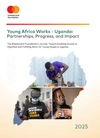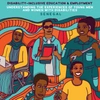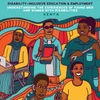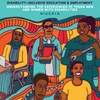Disability Inclusion


Persons with disabilities have immense talent, yet we often leave them behind. We must focus on their abilities, not their disabilities, and give them opportunities to shine.
Doreck Ankunda, Uganda
Understanding what dignified and fulfilling work means for young people with disabilities helps shape the Young Africa Works strategy and further supports the Foundation’s vision of a world where everyone has the opportunity to learn and prosper.
Disability Inclusion Matters
Individuals with disabilities represent an estimated 15 percent of Africa's population.
However, they are twice as likely to be unemployed compared to those without disabilities. Women with disabilities face even greater barriers.
Excluding people with disabilities costs African economies between 3 percent to 7 percent of their GDP. This results in lost potential contributions from their skills, adaptability, and diverse experiences.
Driving Change for an Inclusive Future
-
61% of young people
61 percent of young people with disabilities in Africa are out of school, limiting future employment opportunities. Early exclusion from education leads to lifelong economic disadvantages.
-
Stigma limits potential
Stigma and discrimination perpetuate limiting beliefs about the potential of young people with disabilities. Families, schools, and employers often underestimate their capabilities, reducing their agency and participation in the workforce.
-
Amplifying voices and skill sets
Our programs and partner networks offer significant opportunities to dismantle systemic barriers. By shifting policies, practices, and mindsets, we can amplify the voices and skill sets of young people with disabilities.
Our Approach to Disability Inclusion
Prioritizing inclusion helps open pathways for full participation in society and the workforce. Our approach is guided by three key pillars:
- Strengthening disability inclusion in our programs and partner organizations to enhance access to education and job opportunities.
- Amplifying the voices of young people with disabilities to empower them as transformative leaders driving socio-economic change.
- Improving supportive environments in essential areas such as digital accessibility, inclusive education, and assistive technologies.
Key Initiatives

International Day of Persons with Disabilities
The Mastercard Foundation celebrates the innovative spirit and ingenuity that youth with disabilities bring to breaking down barriers to equitable education and employment and catalyzing innovative solutions for the future of work.
Learn more
Global Disability Summit 2025
In April the Mastercard Foundation and Light for the World co-created to share insights and impact the signature event.
Learn more
Disability-Inclusive Education and Employment: Report series
Recognizing that meaningful inclusion for young people with disabilities starts with listening and learning, the Mastercard Foundation developed a research program to map the policy landscape and to hear directly from young people with disabilities. Two series of reports have been produced, covering the Mastercard Foundation’s seven countries of focus.
Read the reports
Report: Platform Livelihoods for Kenyan Youth with Disabilities
Conducted by inABLE and Technoprise Global in partnership with Caribou Digital and the Mastercard Foundation, this report documents the initial survey of 148 research participants, followed by 86 focus group discussions and in‑depth interviews, to explore how young Kenyans are leveraging social media to sell goods and services.
Read the reportVideo: Innovating for Disability Inclusion
Watch the stories of five incredible young people who have recognized a need within their community and are creating positive change.
Latest Disability Inclusion Research
View All-
Young Africa Works – Uganda: Partnerships, Progress, and Impact
Education and Transitions Uganda -
Disability-Inclusive Education and Employment: Understanding the Experiences of Young Men and Women with Disabilities - SENEGAL
WAEMU -
Disability-Inclusive Education and Employment: Understanding the Experiences of Young Men and Women with Disabilities - KENYA
Disability Inclusion Kenya -
Disability-Inclusive Education and Employment: Understanding the Experiences of Young Men and Women with Disabilities - NIGERIA
Disability Inclusion Nigeria
Video: Disability-Inclusive Education and Employment – Understanding Youth Experiences and Aspirations
Created by researchers from the Uganda Research Unit and the International Centre for Evidence in Disability at the London School of Hygiene & Tropical Medicine, in partnership with young people with disabilities and the Mastercard Foundation, this short film shows what dignified, fulfilling work looks like and means for youth with disabilities in Uganda and Ghana.
Disability Inclusion Latest
-
Applications are Open for the 2025 Mastercard Foundation EdTech Fellowship
-
FAWE Malawi Unveils 2024-2028 Strategic Plan and Phase II Partnership with the Mastercard Foundation to Expand Educational Opportunities for Marginalized Youth
-
Mastercard Foundation and Kifiya Financial Technology PLC to Enable More Than 477,800 MSMEs to Access Uncollateralized Digital Credit Products
-
Carnegie Mellon University and Mastercard Foundation partner to Drive Youth-led Digital Transformation in Africa
-
Young Women Entrepreneurs in Kenya Call for Action to Unlock Finance for Their Businesses
-
Driving Context-Relevant Innovation in EdTech
-
Request For Expression Of Interest: Youth Enabling Oganization To Support In The Recruitment And Management Of Youth-Led Organizations That Will Accelerate Work Opportunities For Young People In Kenya
-
Request For Expression Of Interest: Gender And Inclusion Technical Partner For The Kenya Country Program
-
Inclusive Technology For Learners With Disability
-
Youth Changemakers Leading the Conversation on Disability Inclusion

Youth Changemakers Leading the Conversation on Disability Inclusion
The Mastercard Foundation prioritizes elevating the voices of all youth, including the voices of young people with disabilities.
Recently, the Foundation hosted a roundtable aimed at elevating the voices of young people with disabilities — all of whom are working to drive innovative change in their communities.
In Africa, people with disabilities make up over 80 million of the continent’s population. They’re twice as likely to be unemployed than their counterparts without disabilities. Additionally, the unemployment rate and barriers to dignified and fulfilling work are even higher for women with disabilities.

























